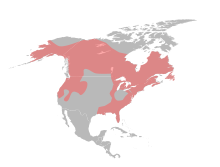Land otter
| North American river otter | |
|---|---|
 |
|
| Scientific classification | |
| Kingdom: | Animalia |
| Phylum: | Chordata |
| Class: | Mammalia |
| Order: | Carnivora |
| Family: | Mustelidae |
| Genus: | Lontra |
| Species: | L. canadensis |
| Binomial name | |
|
Lontra canadensis (Schreber, 1777) |
|
| Subspecies | |
|
see text |
|
 |
|
| Synonyms | |
|
Lutra canadensis |
|
see text
Lutra canadensis
The North American river otter (Lontra canadensis), also known as the northern river otter or the common otter, is a semiaquatic mammal endemic to the North American continent found in and along its waterways and coasts. An adult river otter can weigh between 5.0 and 14 kg (11.0 and 30.9 lb). The river otter is protected and insulated by a thick, water-repellent coat of fur.
The river otter, a member of the subfamily Lutrinae in the weasel family (Mustelidae), is equally versatile in the water and on land. It establishes a burrow close to the water's edge in river, lake, swamp, coastal shoreline, tidal flat, or estuary ecosystems. The den typically has many tunnel openings, one of which generally allows the otter to enter and exit the body of water. Female otters give birth in these underground burrows, producing litters of one to six young.
North American river otters, like most predators, prey upon the most readily accessible species. Fish is a favored food among the otters, but they also consume various amphibians (such as salamanders and frogs), freshwater clams, mussels, snails, small turtles and crayfish. The most common fish consumed are perch, suckers, and catfish. Instances of river otters eating small mammals, such as mice and squirrels, and occasionally birds have been reported as well.
The range of the North American river otter has been significantly reduced by habitat loss, beginning with the European colonization of North America. In some regions, though, their population is controlled to allow the trapping and harvesting of otters for their pelts. River otters are very susceptible to the effects of environmental pollution, which is a likely factor in the continued decline of their numbers. A number of reintroduction projects have been initiated to help stabilize the reduction in the overall population.
...
Wikipedia

